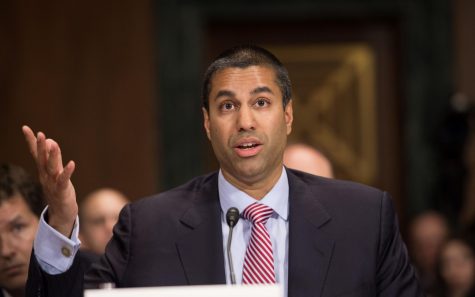Net neutrality deregulated: Public may face premiums for internet access
Since the advent of the modern internet, the masses have access to the content they want, when they want. The internet, even despite of regulations based on country or locale, has been free and promoted with the intent of maintaining personal liberties. Regulations of net neutrality ensured that all content on the internet received the same priority and rates of speed. By not designating priority to certain websites, content, or users, the internet was a mode of promoting equality. The deregulation of net neutrality may change this expectation.
Previous conditions of net neutrality monitored internet service providers, where providers were legally obligated to provide equal access to all apps and online content. By making access to the internet equal and free, companies did not have the ability to choose what media content got priority or preference. The most identifiable feature of the modern internet was its freedom and availability to all people, which was a direct result of net neutrality. But as of December 14, 2017, the repeal of the broadband regulations of the Title II Communications Act is what will make the internet a war zone. Media and service providers will be able to charge customers set prices for access to certain groupings of web content. For instance, there can be a bundle of social media outlets, one of news sources, or another for various search engines.
“Throttling service providers” are now able to slow data selectively and information release based on the type of content, while regulations against paid prioritizations are no longer active. This would allow for providers to supply faster internet and more opportunity to those who can pay a higher price rate for their internet access. While this deregulation may seem far-fetched to the average American, claims of freedom and equality in a laissez-faire economic setting are what earned this change. The greatest outcries against deregulation have been in the name of maintaining equality. In this way, arguments in favor of and against net neutrality are two sides of the same coin.
With the approval of President Drumpf, former Verizon attorney and current Chairman of the United States Federal Communications Commission, Ajit Pai, lobbied for the deregulation of net neutrality. He claimed that relinquishing the unbridled power of the internet to major corporations would ensure the greatest equality among Americans, because corporations act in favor of their customers. But many Americans believe that corporations having supreme power over the internet would not promote equality, but rather unfair competition and allow for those with higher economic status to have the greatest opportunities. A similar argument is issued from the public that corporations will serve in their own financial interest if given control of web access. A major appeal is giving economic freedom and capitalist liberties to the public through massive deregulation, but at the concession of putting internet freedom in the hands of profit-seeking corporations. Major corporations would be able to bundle websites and online content, just as television channels are bundled. This has proven to be a frightening thought for many Americans, considering how effective media corporations are in commandeering the entertainment industry.
Ajit Pai, who spearheaded the deregulation effort, claims that the modern era necessitates greater economic freedom of the internet. In a 2014 editorial to the New York Times, Pai elaborated upon the benefits of deregulation by claiming that it would provide better equality among all news sources, such as local newspapers, because it would allow them to be bought and supported by new buyers, while not being subjected to the competition from major internet corporations, such as Google. In this editorial, Pai said the “need to create a level regulatory playing field [is great]. It makes no sense for internet giants like Google, Facebook and Twitter to be allowed to buy newspapers while a small AM radio station is prohibited from purchasing its local paper.” Pai continued by saying that deregulation would help the dying newspaper industry, but this is nearly a false statement, because newspaper circulation and profits have been steadily decreasing for years. People find their news in other ways, usually through internet methods, and deregulation is not going to change that.
Prior to the congressional decision, protests and resistance were abound against deregulation. Forum websites such as Reddit and Kickstarter made active arguments against the deregulations of net neutrality. Among the outcry, there is also a petitioning service on battleforthenet.com. While the public still is voicing their opinions, it seems that we won’t see the direct effects of deregulation in the immediate future.
While deregulation of net neutrality is not on the forefront of everyone’s minds, it is important to think of the effects it could have on various demographics. What will happen to lower class individuals who lack the money for high-speed internet or selective service? How will students be affected, or school district in poor areas? What does net neutrality mean for the average American?
Only time will tell.


